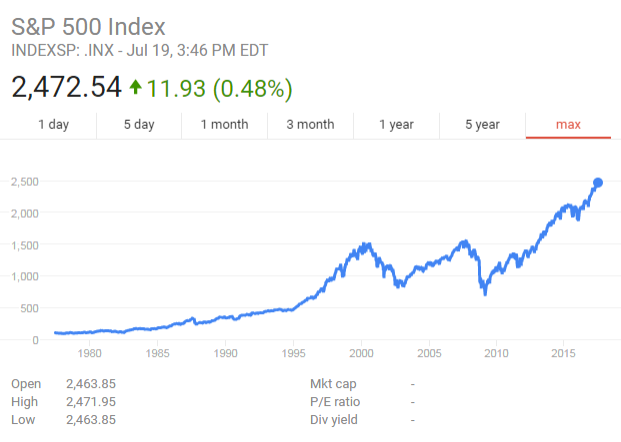Prison And Missile Stocks Soar, Guns Slump Under Trump Administration
Since Donald Trump won the 2016 election, the stock market has undergone an extraordinary boom. But the market’s winners and losers haven’t been entirely predictable. The new president filled his cabinet with conservatives interested in lowering taxes, slashing regulations and boosting law enforcement and border security — raising expectations that fossil fuel corporations, financial firms, private prison companies and other businesses would see major gains.
“The irony of this is, some sectors that people generally thought would benefit the most from the Trump presidency are actually negative,” John Stoltzfus, chief investment strategist at Oppenheimer Asset Management, told International Business Times. “But in other cases, where sectors were supposed to be disfavored, they’re doing terrific.”
Stock prices in industries including defense, technology, finance and health care are up, while others such as telecom and energy are down. Real estate and utilities have underperformed the market as a whole.
The economy has grown relatively slowly since the election. Economists expect second-quarter growth to be around 2 percent, an average figure in the country’s economic recovery, and jobs are growing modestly each month. Wage growth continues its slow, upward crawl.
But stock market indexes, which reflect the stock price values of select major companies — as opposed to the overall strength of the economy — have climbed substantially since Election Day, with the Standard and Poor’s 500 up 15.5 percent since Nov. 8. Stock indexes continue to hover around record highs. However, stocks in some closely-watched industries appear to have already crested as the post-election bump subsides.

Adam Johnson, founder and author of investment newsletter Bullseye Brief, says the market is up for two main reasons that have little to do with the new president. “I call it the two e’s: earnings and employment. We have earnings growth at 7 to 10 percent and the highest number of people working in four decades.”
Here’s how some of the major companies and industries have fared under Trump so far.
Defense Spending Leads To Booming Stocks
The aerospace/defense industry has been on a tear since Trump’s election, with stock gains of roughly 25 percent since early November. The president initially proposed boosting military spending by $54 billion and has escalated the United States’ involvement in wars in Syria and Afghanistan. After Trump made a $110 billion deal with Saudi Arabia in May, defense stocks hit record highs. The industry expects a significant, long-term shift towards increased military spending.
Raytheon saw its stock surge on April 7 after the U.S. launched the company’s Tomahawk missiles in response to a chemical attack on Syrian citizens. The defense manufacturer’s stock went from a price of $136.51 on Election Day — Nov. 8, 2016 — to almost $169 as of July 19, an increase of close to 24 percent. Raytheon is among the companies that will likely benefit from increased missile defense spending due to North Korea’s recent missile testing.

Trump himself owns between $1,000 and $15,000 in Raytheon stock, according to his 2015 financial disclosure to the Federal Election Commission. The president owns between $50,001 and $100,000 worth of stock in military contractor Boeing.
Aerospace company Lockheed Martin took a hit in December after Trump tweeted that the company’s F-35 stealth fighter jets were too expensive, but its stock price has climbed since then. The current contract for the F-35s just increased its price tag to $406 billion. The implementation of Lockheed Martin’s Terminal High Altitude Area Defense system in South Korea, originally scheduled for later this year, was hastened because of tensions with North Korea.
Private Prisons Are Raking It In
With Trump’s focus on deporting undocumented immigrants, increased funding to border security and law enforcement, and Attorney General Jeff Sessions’ push to crack down on gangs and drugs, private prison companies are having a bonanza in the stock market. By late February, private prison stocks were up 100 percent since Trump’s victory.
One of the largest private prison operators, GEO Group, has seen its stock nearly double in value since the election, from close to $16 per share to $30 as of June 19. The company has come under scrutiny for, along with its subsidiary GEO Corrections Holdings, donating $275,000 to a pro-Trump super PAC called Rebuilding America Now, which spent over $21 million on ads attacking Hillary Clinton or praising Trump, according to data compiled by the Center for Responsive Politics. After Trump won, the company gave another $250,000 to Trump’s inauguration committee.
The GEO Group scored a contract to build a large immigration detention center in Texas that will generate $44 million in annual revenue, despite the fact that the company is in the midst of a class-action lawsuit accusing it of violating anti-slavery laws by forcing immigrants to work for less than one dollar per day at a detention center in Colorado.
CoreCivic, formerly the Corrections Corporation of America, has seen a similar increase in its stock value.
The company also put $250,000 towards Trump’s inauguration festivities.
Other Winners
With the executive and legislative branches controlled by conservatives, including Trump, who want to weaken oversight of Wall Street in ways such as softening or repealing the Dodd-Frank financial regulations, the finance industry has rallied since November. At the market’s opening on June 9, for example, the day after the House passed a bill dismantling Dodd-Frank, one key financial index had gained more than 2.3 percent since the previous morning. And with an improving economy, there will be loan growth, which expands banks’ operations and profits.
Johnson sees the contrast between a Trump and a (theoretical) Hillary Clinton White House as substantial. “Banks should be up because [Democratic Sen.] Elizabeth Warren didn’t come in to quash them, because [former Goldman Sachs COO] Gary Cohn is the president’s counsel and may become the new [Fed chair] come January.”
Goldman Sachs, which has numerous alumni besides Cohn in powerful posts in the Trump administration, has seen a stock value increase of 22.5 percent since Nov. 8.
Materials companies have done well in the market, due in part to investors’ confidence that the Trump administration will impose tariffs on imports of foreign-made steel. U.S. Steel had a catastrophic first quarter, but its shares gained 8 percent in June as a result of the tariff talk. Decreased prices of raw materials have also helped increase profitability of products such as concrete and aluminum, says Stoltzfus.
The price of steel has nearly doubled since late 2015, metals analyst John Tumazos told IBT. Combined with expectations of lower corporate taxes, infrastructure spending, trade protection, deregulation and a “buy American” mentality from the Trump administration have all helped the materials industry thrive. Steel production is set to exceed demand, however, and while the industry is probably doing better than it would without a Trump presidency, there are important industry factors that cause fluctuations that the government has little to do with.
“It’s hard for me to imagine a scenario of a two-digit steel market growth in the US,” said Tumazos.
Unexpected Losers
The National Rifle Association warned its supporters repeatedly that if Clinton won the presidency, she’d take away their guns on Day 1. But because Trump, who sided with the NRA on gun policy during his campaign, emerged victorious, gun sales dropped significantly.
“It’s like opposite day,” said Johnson. “You would think an incoming Trump is good for guns, but it’s not, because it removed the urgency.”
FBI background checks, which retailers are required to run whenever selling a gun, dropped by 11 percent in June as compared to June of last year. And that’s better than it’s been; in January, for example, background checks were down 20 percent from the previous year. The stock prices of the two leading gun manufacturers in the U.S., Sturm Ruger and American Outdoor Brands, went way down on the day after the election, and they’ve continued to decline.
The NRA, which represents gun owners, spent more than $30 million in support of Trump during the 2016 campaign.
After Trump’s November win, coal stocks soared as investors bought into the previously endangered companies buoyed by the victory of a candidate who promised to bring back the coal industry and to repeal President Barack Obama’s Clean Power Plan. Peabody Energy stock, for example, surged by 47 percent on Nov. 9. While the outlook for coal is better than it was under Obama, and some coal companies have come out of bankruptcy, Zacks Industry Rank still gives coal a negative outlook, placing it at No. 193 out of 258 industries. A glut of natural gas, and therefore low prices, continues to hurt coal usage. Even after news broke in June that Trump plans to pull the U.S. out of the Paris Climate Agreement, fears of a global backlash against coal interests fueled losses in share prices.
“Probably Trump’s policies will give the industry a bump up and coal will decline less rapidly than otherwise, but coal still faces competition from natural gas, solar, wind and biomass,” said Tumazos.
Arch Coal rose 25 percent from Nov. 7 to Nov. 10, but it’s now back down to roughly the same share price as on Election Day. Cloud Peak Energy stock has dropped 53 percent since the height of investor optimism on Nov. 10, and Southern Company stock is down about 7 percent since Nov. 8. The Dow Jones Coal Index has the industry down by more than 8 percent since Election Day.
“There are 51,000 coal mining jobs in this country. That’s it,” said Johnson. “And by the way, JC Penney has 100,000 employees… Trying to save [the coal] industry is pointless.”
Energy in general is down despite the strongly pro-fossil fuel stance of the administration. The Energy Select Sector Index, which consists mainly of companies that primarily develop and produce crude oil and natural gas, is down by 5 percent since Nov. 8. Much of this decline has to do with factors outside the president’s control, like growing efficiency in oil extraction and refining technology coupled with improving energy efficiency, helping create today’s oil and gas glut, and therefore low prices, according to Stoltzfus.
Johnson says the Trump presidency “really hasn’t” affected oil and gas stocks. “Oil is governed by its own fundamentals.”
Unsurprisingly, solar energy stocks also fell after the president announced his plans to withdraw from the Paris Climate Agreement. First Solar quickly lost 2.5 percent, and SunPower Corp went down 3.4 percent. Uncertainty over federal solar tax credits, and likely a lobbying effort to restrict residential solar operations in the states, has also helped bring stock prices down. Despite stocks having suffered, solar jobs in the U.S. are growing at a startling rate.
Valuation is a factor, too, in terms of solar stock prices declining, says Johnson. The stocks “flew to the moon,” he says, “but very few of them make money.”
But Stolzfus is optimistic for renewable energy, especially solar and wind power, in a global context. Over the past 10 years, green energy has become increasingly more efficient and affordable, and it’s widely popular, especially among millennials. “Every year traditional energy may remain king of the energy complex, but every year it becomes king of smaller kingdom,” says Stolzfus. In countries that have no vested interest in oil production, alternative energy is growing quickly. Plus, clean energy lowers health care costs and decreases expensive environmental monitoring efforts.
Overall, the market appears to be tolerating, and even feeling comfortable, with the current business environment, despite the unpredictable Trump administration. A new administration may have limited immediate impact on the nation’s markets, and large-scale shifts in trade policy are difficult to enact. But the Trump administration has been in power for just six months, and there’s plenty of time for more surprises.
© Copyright IBTimes 2024. All rights reserved.






















